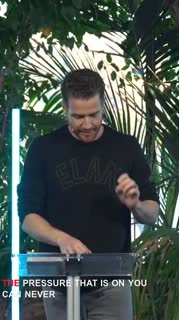Inner Strength: The True Power Beyond Samson's Story
Devotional
Sermon Summary
Bible Study Guide
Sermon Clips
1) "You know, the truth is that when the pressure around you becomes stronger than the pressure within you, you have a problem. Some of you may have heard about the Titan or Ocean Gate. We got a photo of it on the screen. This is a deep sea vessel. I believe it was investigating the Titanic wreckage, if I remember correctly. And this went down there and suffered what is known as a catastrophic implosion. It went down deep enough into the ocean that the pressure on the outside was greater than it could sustain on the inside. And the entire thing collapsed upon itself. You know that implosions can happen in your body. Like with my sinuses, for example. They can happen in the world. Like, for example, in the deep ocean. But implosions can also happen in the spirit." [02:29] (47 seconds)
2) "The pressure that is on you can never become greater than the pressure within you. Or you will suffer a catastrophic implosion. And we live in a world today that is ripe for catastrophic implosions of character. We live in a world today where people want to go high, but they fail to dig deep. People want to celebrate the external gifting, but they want to neglect the internal character. People crave recognition, but they resist accountability. We value appearance, but we disregard substance. We build the platform for ourselves, but we fail to serve others. We love to get public praise, but we neglect private devotion. We demand influence, but lack holiness. All of that together creates an environment for catastrophic implosion." [04:17] (52 seconds)
3) "Your number one role as a parent is to raise your child up in the way that they should go, that they would not depart from it in Jesus' name. That they would love Jesus and walk with Him all the days of their life. And when church becomes optional for parents, faith becomes optional for children. Because kids do not listen to what you say as much as they watch what you do. And if they see you apathetic towards God, they're going to become apathetic towards Him as well. If God is not central in your home, He's more likely to be absent in theirs. You set the example for your kids. So that's my encouragement. To the parents today." [10:43] (36 seconds)
4) "There is a big difference between I made a mistake. I sinned. I messed up. If that's you, welcome to the club. Every single person has made mistakes. Every single person has sinned. There's a big difference between I messed up and I don't care what God says. I'm going to do whatever I want, whenever I want, with whoever I want, however I want, and no one can tell me what to do. That's not just sin. That's rebelliousness. And rebelliousness is a sin. Rebelliousness is something altogether different." [12:51] (30 seconds)
5) "A godly outcome is a win -win, where we're both better off because we're putting God first. A vengeance outcome is always a lose -lose. Nobody wins in vengeance. Vengeance makes great action movies, but it is terrible in real life. Proverbs says this. It says, do not say, I will pay you back for this wrong. Wait for the Lord, and he will avenge you. Wait for the Lord, and he will avenge you. I think we sometimes have a hard time in coming to God with our sin, right? We come to God, and we're like, God, forgive me. Here's my sin. I'm trusting you with it. We give God our sin. That is difficult enough in itself, but what's even harder is not just trusting God with your sin. It's trusting God with their sin." [20:24] (46 seconds)
6) "The whole narrative of this book is that God is so good, even when you and I are completely terrible. God still shows up. He still sees us. He still remembers us. And so if you're here in this room going, I don't know if I'm good enough for God, welcome to the club. None of us are. I'm guessing you didn't kill a thousand people with the jawbone of a donkey. And God still showed up for him. So it's not too late for you either." [22:57] (23 seconds)
7) "The truth is that the spiritual decisions that you make today will become your physical reality tomorrow. If you live a certain way in the spirit and you allow that to sit and marinate, eventually that will manifest itself. And Samson eventually hits rock bottom at this point. Because God's work through you cannot outpace his character in you." [26:37] (23 seconds)
8) "What this tells us is that it is never too late to turn to God. It doesn't matter where you are. It doesn't matter what you've done. It doesn't matter what's happening in your life. It is never too late to turn to God. And so if you're here today and you are a little bit like the prodigal son, where you've wandered off and you're like, I don't know if God can take me back. Can I encourage you? God is so good and he is so kind. And if there's a voice telling you God could never love you, God could never take you back, it's not God. God loves Samson even in the midst of his complete unholiness. And God loves us even in the complete midst of our mess." [29:12] (34 seconds)
9) "I think there's a lie that's in our world today that there are really just good people and bad people. And the whole goal of life is to try to become a good person or a better person. That's kind of what the world tells us today. But who was Samson's greatest enemy? Was it Delilah? No. Was it the Philistines? No. Was it his own men who handed him over to be killed? No. Samson's greatest enemy was Samson. His own greatest enemy was himself." [30:01] (33 seconds)
10) "Heaven is not full of good people. It is full of forgiven people. Not forgiven because of our own works or our own righteousness. Forgiven because God is good, because God saved us. Our salvation, had to come from someone outside of ourselves. We are not inherently good. We are inherently corrupted. And we need to be, as the Bible says, born again, not of the flesh, but of the spirit of God. God's work through you cannot outpace his character in you." [32:00] (29 seconds)
Ask a question about this sermon
2) "The pressure that is on you can never become greater than the pressure within you. Or you will suffer a catastrophic implosion. And we live in a world today that is ripe for catastrophic implosions of character. We live in a world today where people want to go high, but they fail to dig deep. People want to celebrate the external gifting, but they want to neglect the internal character. People crave recognition, but they resist accountability. We value appearance, but we disregard substance. We build the platform for ourselves, but we fail to serve others. We love to get public praise, but we neglect private devotion. We demand influence, but lack holiness. All of that together creates an environment for catastrophic implosion." [04:17] (52 seconds)
3) "Your number one role as a parent is to raise your child up in the way that they should go, that they would not depart from it in Jesus' name. That they would love Jesus and walk with Him all the days of their life. And when church becomes optional for parents, faith becomes optional for children. Because kids do not listen to what you say as much as they watch what you do. And if they see you apathetic towards God, they're going to become apathetic towards Him as well. If God is not central in your home, He's more likely to be absent in theirs. You set the example for your kids. So that's my encouragement. To the parents today." [10:43] (36 seconds)
4) "There is a big difference between I made a mistake. I sinned. I messed up. If that's you, welcome to the club. Every single person has made mistakes. Every single person has sinned. There's a big difference between I messed up and I don't care what God says. I'm going to do whatever I want, whenever I want, with whoever I want, however I want, and no one can tell me what to do. That's not just sin. That's rebelliousness. And rebelliousness is a sin. Rebelliousness is something altogether different." [12:51] (30 seconds)
5) "A godly outcome is a win -win, where we're both better off because we're putting God first. A vengeance outcome is always a lose -lose. Nobody wins in vengeance. Vengeance makes great action movies, but it is terrible in real life. Proverbs says this. It says, do not say, I will pay you back for this wrong. Wait for the Lord, and he will avenge you. Wait for the Lord, and he will avenge you. I think we sometimes have a hard time in coming to God with our sin, right? We come to God, and we're like, God, forgive me. Here's my sin. I'm trusting you with it. We give God our sin. That is difficult enough in itself, but what's even harder is not just trusting God with your sin. It's trusting God with their sin." [20:24] (46 seconds)
6) "The whole narrative of this book is that God is so good, even when you and I are completely terrible. God still shows up. He still sees us. He still remembers us. And so if you're here in this room going, I don't know if I'm good enough for God, welcome to the club. None of us are. I'm guessing you didn't kill a thousand people with the jawbone of a donkey. And God still showed up for him. So it's not too late for you either." [22:57] (23 seconds)
7) "The truth is that the spiritual decisions that you make today will become your physical reality tomorrow. If you live a certain way in the spirit and you allow that to sit and marinate, eventually that will manifest itself. And Samson eventually hits rock bottom at this point. Because God's work through you cannot outpace his character in you." [26:37] (23 seconds)
8) "What this tells us is that it is never too late to turn to God. It doesn't matter where you are. It doesn't matter what you've done. It doesn't matter what's happening in your life. It is never too late to turn to God. And so if you're here today and you are a little bit like the prodigal son, where you've wandered off and you're like, I don't know if God can take me back. Can I encourage you? God is so good and he is so kind. And if there's a voice telling you God could never love you, God could never take you back, it's not God. God loves Samson even in the midst of his complete unholiness. And God loves us even in the complete midst of our mess." [29:12] (34 seconds)
9) "I think there's a lie that's in our world today that there are really just good people and bad people. And the whole goal of life is to try to become a good person or a better person. That's kind of what the world tells us today. But who was Samson's greatest enemy? Was it Delilah? No. Was it the Philistines? No. Was it his own men who handed him over to be killed? No. Samson's greatest enemy was Samson. His own greatest enemy was himself." [30:01] (33 seconds)
10) "Heaven is not full of good people. It is full of forgiven people. Not forgiven because of our own works or our own righteousness. Forgiven because God is good, because God saved us. Our salvation, had to come from someone outside of ourselves. We are not inherently good. We are inherently corrupted. And we need to be, as the Bible says, born again, not of the flesh, but of the spirit of God. God's work through you cannot outpace his character in you." [32:00] (29 seconds)









